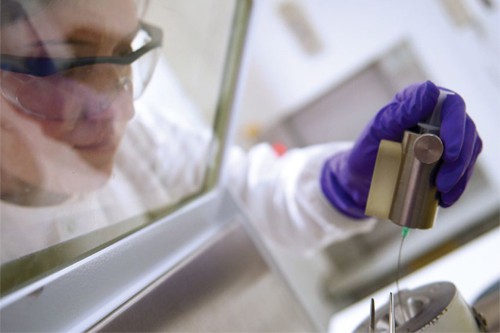
The UK is to map the genomes of up to 100,000 patients suffering from cancer and rare diseases in a bid to provide them with more personalised care.
The government said the pledge, contained in its UK Life Sciences One Year On progress report, would also help develop new drugs and fuel future scientific breakthroughs.
Prime minister David Cameron, introducing the report, said: “Genetic science has the potential to transform healthcare systems around the world.
“In the coming years, we will start to harness the power of genomic data in the UK to improve patient care, develop innovative new drugs and bioinformatics technologies, and create world-class genomic platforms for innovation that will drive global investment to the UK.”
The DNA mapping will take place over the next three to five years and the government has set aside £100m to pay for it.
This will be used to train “a new generation of British genetic scientists”, prepare the wider healthcare community and ensure the NHS has the necessary data infrastructure.
The funding will come from the £600m promised by the Chancellor in his Autumn Statement last week to support scientific research and make the UK more competitive.
UK life sciences strategy – one year on
The government’s Strategy for UK Life Sciences was launched last year and put in place a £181m package of measures to support the sector.
Assessing the Strategy’s impact after its first 12 months, minister for science and universities David Willetts said its initiatives had attracted more than £1bn of private sector investment to the UK.
This came from projects such as GSK’s £530m manufacturing investment in Cumbria and the expansion of Eisai’s European business hub in Hatfield.
“We can see clear evidence the UK is succeeding in creating the right environment to attract global investment to our shores and continue to be a world leader in life sciences,” Willetts said.
The UK Life Sciences One Year On report was broadly welcomed by UK trade bodies.
ABPI chief executive Stephen Whitehead praised the cancer genome initiative, saying “the UK is in a prime position to lead on the development and delivery of personalised medicines, bringing them to the patients who are most likely to benefit”.
But he warned that a lot more must be done, highlighting problem areas such as local NHS progress on the government’s Innovation, Health and Wealth programme, the UK’s declining share of global clinical trials and NHS spending on new medicines.
Meanwhile, biotech body the BIA praised the Strategy’s Biomedical Catalyst fund and the much-needed accelerator funding it provides to overcome the so-called ‘valley of death’ between bench and clinic.
Its CEO Steve Bates said: “The Biomedical Catalyst is providing significant funds to help companies progress key projects and demonstrates the government’s commitment to early stage life science companies. The funding process has been simple and flexible which is important to small companies.”
But he added financing remains a key issue for bioscience companies in the UK and took the opportunity to repeat the BIA’s long-standing call for Citizens’ Innovation Funds – whose tax breaks it says would encourage ‘crowdsourced’ funding.




